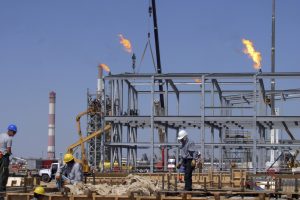While the price of U.S. oil touched negative figures, jeopardizing the local and international market, Brent oil dipped below $20/barrel, keeping Kazakhstan, Central Asia’s main exporting country, braced for a long term crisis. The COVID-19 pandemic, in these circumstances, is the additional weight that could tip the scale toward a recession.
After the Saudi and Russian governments played a self-defeating arm wrestling match over plans to cut output among oil exporting countries in March, the price of oil began a downward spiral. The Saudi decision to increase production and flood the market with cheap oil was countered by Russia’s reaction as it also increased production, sending oil prices further down.
Neither country wanted to lose market share, much to the initial benefit of the traders. The latter, however, soon were confronted with a consumer market unripe to absorb the extra supply, especially due to the COVID-19 pandemic. The virus has proved difficult to contain, leading to a depression in both industrial production and energy demand for transport. Flights were grounded and cars remained parked, as cities and countries around the world entered lockdown mode.
Kazakhstan, a key oil exporter in Central Asia, had to reduce shipments of oil to China, where demand fell in the first quarter of the year, and could reduce both production and exports this year in the face of low Brent prices in the mid-term.
A worrying sign for the whole energy industry in Kazakhstan comes from the Tengiz oil field. The field was discovered in Soviet times, and the concession for production was awarded to Chevron in 1993. The California-based company established, together with ExxonMobil, Lukoil, and the state-owned company, the Tengizchevroil consortium headquartered in Atyrau, in western Kazakhstan. In 2016, after one generation of successful production, the consortium decided to bet on a mammoth investment of $37 billion, the “Future Growth Project” (FGP), to increase production by around 50 percent.
In January 2020, Chevron said that the cost could have been underestimated and adjusted the final figure to $45 billion, a declaration that found opposition at the Kazakh Ministry of Energy. According to the contracts, in fact, the government only reaps the benefits of oil exports after all of the consortium costs are recovered. Higher costs could mean a longer wait for Kazakhstan.
“While we wish that the execution was going better than it is and [are] disappointed in the cost and schedule update, there are not many companies in the world that can do a project like that at all,” Michael Wirth, Chevron’s CEO, said at the company’s earnings conference call in January.
The fall of Brent prices, however, changed the course of Tengizchevroil’s plans. In early April, it delayed scheduled maintenance at the field and its connected factories until next year. Tests also revealed that some of the workers were infected with COVID-19, which led to quarantine measures in the rotation camps. Workers then protested the business-as-usual attitude of the company, which could put the lives of the rotation workers and their families at risk. Tens of thousands of workers are involved in the FGP and most of them reside in rotation camps built near the field, 300 kilometers (186.4 miles) of poorly-paved surface transport from the southeast side of Atyrau. While Tengizchevroil discontinued rotation shifts for its workers on March 21, several contractors continued to send employees to the camps.
Quarantine at one of the rotation villages prompted the consortium to halt and postpone the FGP. In mid-April, Tengizchevroil and its contractors kicked off a process of “extraction” of their personnel from the rotation village. Some workers, however, were left at the camps and the continued spread of COVID-19 prompted protests on April 20. On the same day, 500 workers at Сonsolidated Contracting Engineering and Procurement (CCEP), already involved in an infamous incident last year, refused to work for fear of infection. In an unfortunate coincidence, a leak at a crude processing facility at Tengiz on April 19 led to massive emissions of yellow smoke, carrying high content of highly-toxic sulfur dioxide.
At present, business associations in the oil sector are counting the potential losses in terms of both manpower and revenues similarly to countries reporting the effects of COVID-19 on their population. These “war bulletins” predict hundreds of millions of dollars in lost business and several dozen companies potentially going bankrupt. As a boost for local companies, the Ministry of Energy suspended the slower tender process since the end of March, allowing extractive companies to buy Kazakhstan-made materials directly from domestic producers.
Oil production in Kazakhstan could shrink by 15 percent this year. In addition, similar to the global trend, demand for industrial fuel, gasoline, and aviation fuel has dropped significantly in Kazakhstan, leading to a slowdown in the activity of the three refineries in Atyrau, Shymkent, and Pavlodar.
In the crossfire between low oil prices and the COVID-19 pandemic, Kazakhstan is bracing for a dip in GDP, higher unemployment, and a weaker tenge currency. Around 4 million residents have already received the first government check of 42,500 tenge (around $95), a small yet necessary contribution for the survival of many households across the country. It is unclear whether and how the government will continue to support the population, but the prospective job losses in the energy sector will have a long-term effect on the country’s economy.

































